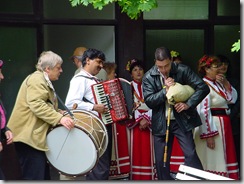[A version of this article first appeared as a post on my blog From the Front of the Choir]
Somebody asked me the other day if I do workshops on songs from the musicals. I don't like musical theatre, so the answer was a resounding “No”.

Many people come to singing workshops because they just love to sing. They’ll sing anything, as long as they’re singing. Me, I only like to sing particular kinds of music. I need to love the music before I can sing it. Any old thing just won’t do. So what is it I do like?
A long time ago I fell into harmony singing by encountering full-on songs from the Balkans, then Georgia, and then more generally Eastern Europe. I love klezmer bands, gypsy singing, Balkan brass, middle-Eastern lullabies – all that kind of stuff.
Next I discovered the amazing harmony singing from South Africa. Later I moved onto other Southern African countries, then onto the whole of Africa.
I couldn’t get enough of the stuff!
Over the years I’ve focused on unaccompanied harmony singing. The kind of stuff you hear from countries like Bulgaria and South Africa. Some people call it ‘choral singing’, but for me that doesn’t do it justice. The songs I like tend to come from age-old traditions. They’re effectively folk songs. They’re sung in a full-voiced, passionate, open way without artifice.
I know what I mean, but it’s quite hard to pin down because we all have different definitions of the words we use. Let's look at some of those.
I bandy the word ‘harmony’ about. By this I mean usually three or four different parts being sung at the same time. Sometimes the parts are far apart, at other times very close and slightly clashing.
In daily life we use the word ‘harmony’ to mean people getting along and working together, usually doing something similar to each other with some kind of implicit agreement and no conflict. But in singing, that would probably lead to unison singing, or at least only ‘nice’ harmonies. In singing ‘harmony’ means something different.
Then there’s ‘close harmony’. This is when the notes in different parts are close together. Unlike the clashing harmonies in Balkan songs, it usually means that all the parts are close together most of the time. This is the kind of thing you tend to hear in barbershop singing. I don't like barbershop.
Some people don’t like harmonies with lots of ‘holes’ in them (e.g. fifths). They prefer ‘proper’ harmony, as opposed to more rhythmic singing where the parts are quite far apart.
Then there’s ‘acappella’. I try not to use that term. Most of the general public don’t know what it means so I use the phrase ‘unaccompanied singing’ or ‘singing without instrumental backing’. Acappella has come to mean vocal groups singing genres like doo wop and barbershop, or an ‘unplugged’ version of a well-known pop song (see Why I don't like acappella). Whilst those with a more classical or religious background take it to mean early church singing such as madrigals.
Is what I like ‘choral singing’? Not really as this is most often associated with church singing and/ or more formal, music-reading groups of singers who often focus on choral ‘literature’ and Western classics. The kind of music I love doesn’t tend be sung by ‘choirs’.
I often say that the singing I like comes from the ‘world music’ repertoire. But so many people don’t even know what that means! It was a term invented by record companies to try to promote music that didn’t fit neatly into any of the existing categories. Even if someone does have an idea of what it means, they usually associate it with guitar music from Mali, or the Buena Vista Social Club.
I’ve discovered that it’s hard to explain the kind of singing and songs I’m drawn to. I can’t sing them to people (I can only do one part at a time!), so I need to resort to other reference points (“You know that song that advertises baked beans or German cars?”), or more simply, play an example.
Which is what I’ll do next week. I’ll try to find some good examples of the kinds of singing that I like and give links to them: Now THAT'S what I call singing! Volume 1. See you then!
Chris Rowbury
website: chrisrowbury.com
blog: blog.chrisrowbury.com
Facebook: Facebook.com/ChrisRowbury
Twitter: Twitter.com/ChrisRowbury